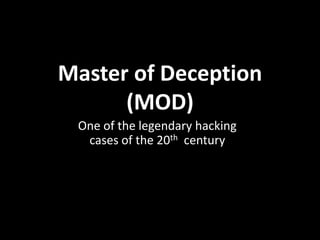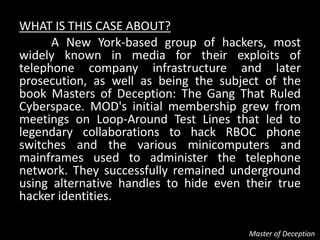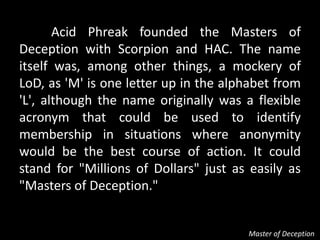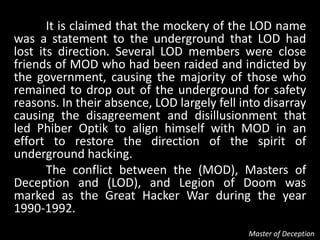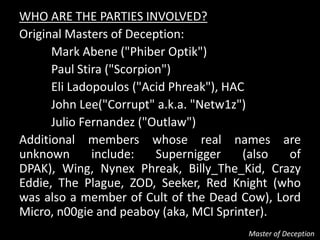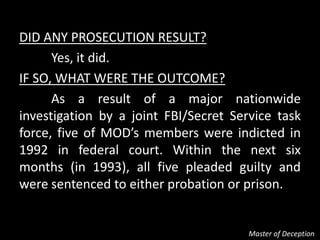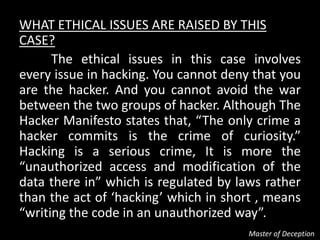Master of deception (mod)
- 1. Master of Deception (MOD) One of the legendary hacking cases of the 20th century
- 2. WHAT IS THIS CASE ABOUT? A New York-based group of hackers, most widely known in media for their exploits of telephone company infrastructure and later prosecution, as well as being the subject of the book Masters of Deception: The Gang That Ruled Cyberspace. MOD's initial membership grew from meetings on Loop-Around Test Lines that led to legendary collaborations to hack RBOC phone switches and the various minicomputers and mainframes used to administer the telephone network. They successfully remained underground using alternative handles to hide even their true hacker identities. Master of Deception
- 3. Acid Phreak founded the Masters of Deception with Scorpion and HAC. The name itself was, among other things, a mockery of LoD, as 'M' is one letter up in the alphabet from 'L', although the name originally was a flexible acronym that could be used to identify membership in situations where anonymity would be the best course of action. It could stand for "Millions of Dollars" just as easily as "Masters of Deception." Master of Deception
- 4. It is claimed that the mockery of the LOD name was a statement to the underground that LOD had lost its direction. Several LOD members were close friends of MOD who had been raided and indicted by the government, causing the majority of those who remained to drop out of the underground for safety reasons. In their absence, LOD largely fell into disarray causing the disagreement and disillusionment that led Phiber Optik to align himself with MOD in an effort to restore the direction of the spirit of underground hacking. The conflict between the (MOD), Masters of Deception and (LOD), and Legion of Doom was marked as the Great Hacker War during the year 1990-1992. Master of Deception
- 5. WHO ARE THE PARTIES INVOLVED? Original Masters of Deception: Mark Abene ("Phiber Optik") Paul Stira ("Scorpion") Eli Ladopoulos ("Acid Phreak"), HAC John Lee("Corrupt" a.k.a. "Netw1z") Julio Fernandez ("Outlaw") Additional members whose real names are unknown include: Supernigger (also of DPAK), Wing, Nynex Phreak, Billy_The_Kid, Crazy Eddie, The Plague, ZOD, Seeker, Red Knight (who was also a member of Cult of the Dead Cow), Lord Micro, n00gie and peaboy (aka, MCI Sprinter). Master of Deception
- 6. DID ANY PROSECUTION RESULT? Yes, it did. IF SO, WHAT WERE THE OUTCOME? As a result of a major nationwide investigation by a joint FBI/Secret Service task force, five of MODŌĆÖs members were indicted in 1992 in federal court. Within the next six months (in 1993), all five pleaded guilty and were sentenced to either probation or prison. Master of Deception
- 7. WHAT ETHICAL ISSUES ARE RAISED BY THIS CASE? The ethical issues in this case involves every issue in hacking. You cannot deny that you are the hacker. And you cannot avoid the war between the two groups of hacker. Although The Hacker Manifesto states that, ŌĆ£The only crime a hacker commits is the crime of curiosity.ŌĆØ Hacking is a serious crime, It is more the ŌĆ£unauthorized access and modification of the data there inŌĆØ which is regulated by laws rather than the act of ŌĆśhackingŌĆÖ which in short , means ŌĆ£writing the code in an unauthorized wayŌĆØ. Master of Deception

